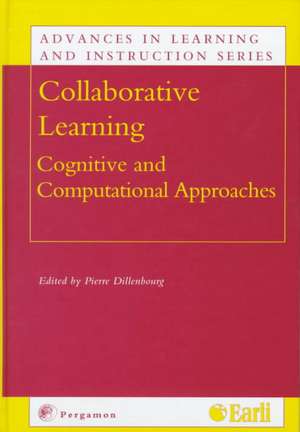Collaborative Learning: Advances in Learning and Instruction Series
Autor Pierre Dillenbourg, Dillenbourg, P. Dillenbourgen Limba Engleză Hardback – 16 feb 1999
Preț: 923.03 lei
Preț vechi: 1198.74 lei
-23% Nou
Puncte Express: 1385
Preț estimativ în valută:
176.62€ • 184.90$ • 146.14£
176.62€ • 184.90$ • 146.14£
Carte tipărită la comandă
Livrare economică 05-19 aprilie
Preluare comenzi: 021 569.72.76
Specificații
ISBN-13: 9780080430737
ISBN-10: 0080430732
Pagini: 260
Dimensiuni: 156 x 234 x 16 mm
Greutate: 0.54 kg
Ediția:Revised
Editura: Emerald Group Publishing Limited
Seria Advances in Learning and Instruction Series
ISBN-10: 0080430732
Pagini: 260
Dimensiuni: 156 x 234 x 16 mm
Greutate: 0.54 kg
Ediția:Revised
Editura: Emerald Group Publishing Limited
Seria Advances in Learning and Instruction Series
Cuprins
Acknowledgement. Contributors. Introduction: what do you mean by 'collaborative learning'? (P. Dillenbourg). Learning together: understanding the processes of computer-based collaborative learning (K. Littleton, P. Häkkinen). The role of grounding in collaborative learning tasks (M. Baker et al.). What is "multi" in multi-agent learning? (G. Weiss, P. Dillenbourg). Comparing human-human and robot-robot interactions (R. Joiner et al.). Learning by explaining to oneself and to others (R. Ploetzner et al.). Knowledge transformations in agents and interactions: a comparison of machine learning and dialogue operators (E. Mephu Nguifo et al.). Can analytic models support learning in groups? (H.U. Hoppe, R. Ploetzner). Using telematics for collaborative knowledge construction (T. Hansen et al.). The productive agency that drives collaborative learning (D. Schwatrtz). References. Index.
Recenzii
Ann Jones, The Open University, Milton Keynes
There is no doubt that collaborative learning will continue to be an important area of research for a number of reasons: learning is now viewed as a lifelong activity and increasingly takes place in contexts where learning from interactions with others, whether around technology or through technology, is a vital part of that process. This book plays an important role in documenting and continuing the debate among scientists in two key fields.
Computers and Education
There is no doubt that collaborative learning will continue to be an important area of research for a number of reasons: learning is now viewed as a lifelong activity and increasingly takes place in contexts where learning from interactions with others, whether around technology or through technology, is a vital part of that process. This book plays an important role in documenting and continuing the debate among scientists in two key fields.
Computers and Education



















